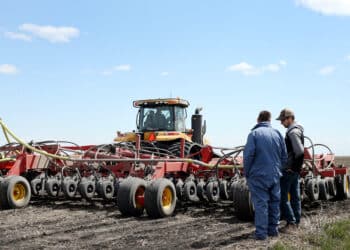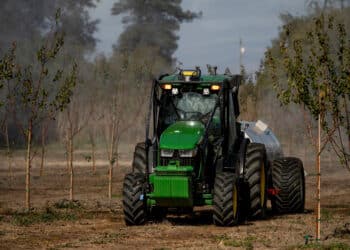Stalled farm payments loom over ag equipment sector
US ag secretary: Trump administration ‘months away’ from farm aid decision
A slower-than-expected rollout of farm subsidies and tariff uncertainty are damaging farmer sentiment, possibly hindering equipment purchasing and driving up delinquencies.
Farmers had been holding out hope that subsidies would help offset the inflationary impact of tariffs. President Donald Trump during his first term signed the 2018 Farm Bill, allotting $428 billion for farm loans, disaster assistance and other programs over five years. The U.S. Senate in December extended that bill through September.
And Trump in 2019 authorized the U.S. Department of Agriculture to provide up to $14.5 billion in farm aid through the Market Facilitation Program (MFP) to minimize the impact of retaliatory tariffs on agricultural exports.
But as tariffs mount this year, including a universal 10% tariff imposed by Trump on April 2, farmers fear that whatever money they receive this year will not be enough, Michael Langemeier, associate director at the Center for Commercial Agriculture at Purdue University, told Equipment Finance News.
“If we do have MFP payments, that would occur much, much later,” he said. “And just to reiterate how difficult it is to calculate the impact of tariffs and trade — [farmers] went through that last time — and that’s something you can’t really compute until you see where the prices are going to end up this summer and fall, particularly this fall for the new crop. So those payments, I don’t think, are imminent in 2025.”
U.S. Secretary of Agriculture Brooke Rollins responded to these concerns in a statement to EFN, saying the Trump administration is “literally months away from understanding” whether the MFP payments will be necessary.
“I don’t believe that it will,” she said. “But if it is, then this president has always said and he is resolute in his commitment to our farmers and our ranchers and our great rural communities in America. So we will make sure we’re ready — if in fact that is necessary.”
Conversely, 74% of roughly 400 farmers said passage of a new farm bill this year was important or very important to them, according to Purdue University’s Ag Economy Barometer report, released April 1, and a survey conducted March 10-14.
Impact on ag equipment
If MFP payments are not distributed, the inflationary impact of tariffs is likely to stymie equipment purchasing and could increase delinquencies on equipment loans as cash flow tightens, particularly in the crop sector, Langemeier said.
“Repaying debt comes before buying machinery. And that’s just not going to leave much in terms of purchasing machinery. The people that will be buying machinery, whether that’s new or used, are those that just absolutely have to have something because their old machines wore out.”
— Michael Langemeier, associate director, Center for Commercial Agriculture at Purdue University
However, many livestock farmers are doing “quite well” in terms of financial performance and are better positioned to purchase equipment this year, Langemeier said.
Farmers respond
Purdue’s Ag Economy Barometer, which measures overall sentiment, dropped 12 points in March to 140, largely due to tariff concerns and lower crop prices. The Farm Financial Performance Index fell 8 points to 102, and the Capital Investment Index declined 5 points to 54, according to the report.
Lower sentiment largely came from producers of soybeans, cotton and wheat, which are among the most dependent on exporting, Langemeier said.
Further, the Minnesota Soybean Growers Association issued the following statement from President Darin Johnson in response to Trump’s April 2 tariffs:
“As Minnesota family farmers, our livelihoods depend on strong trade partnerships across the globe. Soybeans are Minnesota’s top ag export — about 60% of our crop is sent to international markets. To damage those relationships that we’ve spent decades building would be devastating to not just farmer profitability, but rural and urban communities across Minnesota. We’ve already seen that no one wins in a trade war.”
The third annual Equipment Finance Connect at the JW Marriott Nashville in Nashville, Tenn., on May 14-15, 2025, is the only event that brings together equipment dealers and lenders to share insights, attend discussions on crucial industry topics and network with peers. Learn more about the event and register here.









